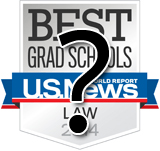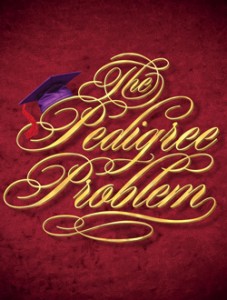Beware the IP Law Rankings
by Science to Law • April 27, 2013 • Law School
 Are you using the wrong law school rankings?
Are you using the wrong law school rankings?
If you’re a grad-level scientist relying on the US News Best Intellectual Property Law Programs rankings, you may well be.
Don’t confuse these IP rankings with the critically important US News Best Law Schools rankings. It’s quite honestly almost impossible to overstate the importance of those general rankings to law firms and lawyers in general. This is a commonly accepted truth that generates periodic gosh-oughtn’t-we-wise-up laments from the profession. (For instance, the ABA Journal in its July 2012 cover story The Pedigree Problem complained that “[t]his near obsession with pedigree is not only paralyzing to the career prospects of individual lawyers; it is damaging to the entire profession.” At this, lawyers nodded sympathetically before reverting to precisely what they were doing before, which was probably shredding resumes from graduates of modestly ranked schools.)
Rankings mania is very real in the legal profession. Part of this obsession probably stems from the fact that the US News Best Law Schools rankings quickly became a self-fulfilling prophecy: Law schools fight hard for each zero-sum rung on this ladder, and the top applicants overwhelmingly seem to select the top-ranked schools. The rankings also have proven surprisingly stable over time, and their monopoly is only strengthened by the fact that some alternative rankings systems are plainly self-interested. All this is a whole topic in itself, but for now let’s just agree that despite their somewhat arbitrary nature and inherent biases, whether we like it or not, the US News Best Law Schools rankings really do matter a whole lot.
But here it gets tricky. US News also compiles sub-rankings, including a list of the Best Intellectual Property Law Programs.
They want you to believe that for would-be IP attorneys, these rankings control.
Consider the US News party line, as stated in How to Apply to Law School as an Engineer or Scientist (US News Law Admissions Lowdown, May 7, 2012). In this Q&A article addressing “how engineers and those with a science background can best position themselves for success in law school admissions,” author Shawn O’Connor stated that:
As you may know, it is very important that you choose the schools to which you apply based on the strength of their patent/intellectual property programs, and not just their overall ranking.
I flatly disagree, and so does every practicing IP partner I’ve asked.
I mean, I get the reasoning. To rank programs for specialty fields like IP makes sense in the abstract, and it’s certainly nice to recognize schools that have devoted considerable resources to building strong IP programs. And it’s not as though the list is somehow cursed turf: Berkeley and Stanford sit at #1 and 2, and they’re ranked in the top 10 of the main law rankings as well.
But the six-figure question is whether, given the option, you should choose a top-10 ranked IP program over a top-10 ranked general law program. Assuming you’re a scientist with a graduate degree, you should not.
First, rankings need an audience, and IP lawyers are still lawyers — the very same audience already head-over-heels obsessed with the main US News rankings. People use prestige as a shorthand, and very few lawyers that I know of actually keep track of which lower-ranked schools have invested in their IP programs of late. The primary law school rankings are in this sense a victim of their own success, deeply ingrained and tough to unseat.
Second, even if potential employers might appreciate the value of a particular IP specialty program, the clients who hire those lawyers might not. Do you think an employer will take that chance in hiring you, or will they make the safe play? Now’s the time to wonder — not when it’s too late.
Third, anyone urging strict reliance on the IP sub-rankings operates with a flawed and unstated assumption: That the substance of your legal education — i.e., which courses you take — matters more to employers than vague notions of school prestige. Applicants, particularly those poised to drop $200k on a degree, desperately want this to be true. It’s not. While having a few more patent law courses under your belt might seem like a good way to get a leg up, you’ll get a far bigger (and more lasting) leg up by choosing a top overall school.
Fourth, as a graduate-level scientist going to law school, you already have all the IP credibility you need. In my experience, IP practice groups prefer to lure candidates with strong technical backgrounds and teach them the intricacies of IP law on the job. A law school applicant straight out of undergrad might weigh IP rankings a bit more heavily to position themselves for IP firms, but as a scientist, you don’t need to. You are the credential.
Finally, are you sure you want to do patent law? I certainly wasn’t when I was applying to schools, and even as a practicing IP attorney I remain skeptical of anyone who dumps all eggs in that basket before even starting 1L year. There are plenty of interesting things to do in law, with or without a science background.
As a graduate of a highly-ranked school with a modest IP program, I admit to some personal bias on this issue. Which is precisely why, when a law school hopeful asked me to vet her school choices earlier this year, I asked IP litigation partners in my practice group (a big firm), an IP litigation partner at a midsize firm, and a partner at a small patent prosecution firm how they felt about these US News IP rankings. (For good measure, I asked some midlevel and senior associates, too.) Every person I asked separately and independently gave the same basic advice: Don’t worry about loading up on IP courses in law school; just go to the highest ranked general program you get in to.
My sample is far from scientific, but then neither is US News’s unsupported assertion that it is “very important” to pick schools “based on the strength of their patent/intellectual property programs, and not just their overall ranking.” Did they talk to real lawyers before writing that? My experience suggests they did not.
All this doesn’t mean you should ignore the IP sub-rankings entirely. If the highest-ranked school you get into also happens to be a top player in the IP sub-rankings, that’s great. And if you’re shut out of the so-called T14 (the top fourteen law schools in the general ranking), then IP specialty schools might merit a closer look. But assuming a T14 option is on the table, I certainly wouldn’t dip lower to chase an IP specialty program.
The main Best Law Schools ranking is unquestionably a flawed device, particularly for students hoping to go into IP. Strict reliance on it seems illogical.
But one of the big shifts in moving from science to law is understanding that what is logical is not always right. The IP sub-rankings are a nice idea. It’d make sense if employers and clients suddenly adopted them — much like, as the ABA complains, it’d be nice if lateral associate hiring were always based on actual merit. But here, as there, wishing doesn’t make it so.

